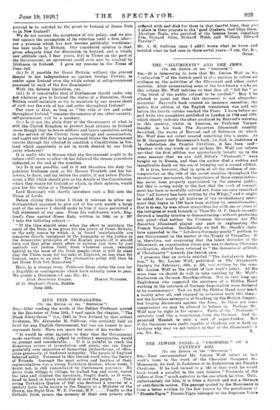SINN FEIN PROPAGANDA.
[To THE EDITOR or Taz " Seecriroa."1
Sim,—After reading the words of the Belfast Professor quoted in the Spectator of June 12th, I read again the chapter, " The Black Forty-Seven" (i.e., 1847) in New Ireland by that ardent Irishman, Mr. Alexander M. Sullivan, who certainly held no brief for any English Government, but was too honest to mis- represent facts. Have you space for some of his words?- " It would be utter injustice to deny that the Government made exertions which, judged by ordinary emergencies, would be prompt and considerable. . . If it is painful to reach the disastrous errors of irresolution and panic, one can linger gratefully over memories of Samaritan philanthropy, of effica- cious generosity, of tenderest sympathy. The people of England behaved nobly. Foremost in this blessed work were the Society of Friends. Amongst the most active and fearless of their representatives was a young Yorkshire Quaker, whose name, I doubt not, is still remembered by Connemara peasants. He drove from village to village, he walked bog and moor, rowed the lake and climbed the mountain, fought death, as it were, hand to hand in brave resolution to save the people. . . . That young Yorkshire Quaker of 1847 was destined a quarter of a century later to be known to the Empire as a Minister of the Crown, the Right Hon. W. E. Forster, M.P Fondly as the Catholic Irish revere the memory of their own priests who sneered with and died for them in that fearful time, they give a place in their prayers to the good Quakers, God bless them,' Abraham Beale, who perished of the famine fever, Jonathan Pito, Richard Allen, Richard Webb, and William Edward Forster."
Mr. A. M. Sullivan (may I add?) wrote what he knew and testified what he had seen in those awful years.—I am, Sir, &c., Oulu.






































 Previous page
Previous page